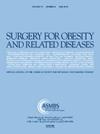评估对寻求代谢和减肥手术的患者进行睡眠评估的可靠性和有效性。
IF 3.5
3区 医学
Q1 SURGERY
引用次数: 0
摘要
背景:80%以上寻求代谢和减肥手术(MBS)的患者报告睡眠功能紊乱。目前还没有研究对代谢性肥胖样本中睡眠测量的心理计量特性进行评估:本研究评估了匹兹堡睡眠质量指数(PSQI)和失眠严重程度指数(ISI)在大量寻求代谢与减肥手术患者样本中的可靠性和有效性:两个学术医疗中心:方法:在手术前进行睡眠测量(PSQI 和 ISI)和心理功能测量,包括抑郁症状快速量表(QIDS)。通过平均项目间相关性和项目总相关性评估内部一致性。根据文献中确定的模型,通过确认性因子分析(CFAs)以及测量收敛性和鉴别性来评估结构效度:参与者(N = 939)主要为女性(83.4%),平均年龄为 41.7 岁(SD = 11.5),平均体重指数(BMI)为 47.5 kg/m2(SD = 8.5)。CFA表明,PSQI和ISI的2因素解非常拟合。PSQI 和 ISI 的内部一致性可以接受。PSQI 和 ISI 之间的相关性较大(r = .80,p < .001),PSQI、ISI 和 QIDS 之间的相关性适中(rs > .50,ps < .001),这些都证明了聚合有效性。PSQI 和 ISI 与 QIDS 的睡眠功能评估项目呈中度相关(P < .001),但与食欲变化评估项目的相关性较小(r < .10),显示出良好的判别效度:研究结果表明,PSQI 和 ISI 对接受 MBS 治疗的患者具有可靠性和有效性。本文章由计算机程序翻译,如有差异,请以英文原文为准。
Assessing the reliability and validity of sleep assessments in patients seeking metabolic and bariatric surgery
Background
More than 80% of patients seeking metabolic and bariatric surgery (MBS) report disturbance in sleep function. No studies have assessed the psychometric properties of sleep measures in MBS samples.
Objectives
This study assessed the reliability and validity of the Pittsburgh Sleep Quality Index (PSQI) and the Insomnia Severity Index (ISI) in a large sample of patients seeking MBS.
Setting
Two academic medical centers.
Methods
Measures of sleep (PSQI and ISI) and psychological functioning, including the Quick Inventory of Depressive Symptomatology (QIDS), were administered presurgically. Internal consistency was assessed with mean inter-item correlations and item-total correlations. Construct validity was assessed using confirmatory factor analyses (CFAs) based on models identified in the literature and by measuring convergent and discriminant validity.
Results
Participants (N = 939) were primarily female (83.4%) with a mean age of 41.7 (SD = 11.5) years and mean body mass index (BMI) of 47.5 kg/m2 (SD = 8.5). CFAs indicated excellent fit for 2-factor solutions for the PSQI and ISI. Internal consistency for the PSQI and ISI were acceptable. Convergent validity was demonstrated by large correlations between the PSQI and ISI (r = .80, p < .001), and moderate correlation between the PSQI, ISI, and QIDS (rs > .50, ps < .001). The PSQI and ISI were moderately correlated with QIDS items assessing sleep function (P < .001), but correlations with items assessing appetite change were small (r < .10), demonstrating good discriminant validity.
Conclusions
Results support the reliability and validity of the PSQI and ISI for patients undergoing MBS.
求助全文
通过发布文献求助,成功后即可免费获取论文全文。
去求助
来源期刊
CiteScore
6.70
自引率
12.90%
发文量
570
审稿时长
56 days
期刊介绍:
Surgery for Obesity and Related Diseases (SOARD), The Official Journal of the American Society for Metabolic and Bariatric Surgery (ASMBS) and the Brazilian Society for Bariatric Surgery, is an international journal devoted to the publication of peer-reviewed manuscripts of the highest quality with objective data regarding techniques for the treatment of severe obesity. Articles document the effects of surgically induced weight loss on obesity physiological, psychiatric and social co-morbidities.

 求助内容:
求助内容: 应助结果提醒方式:
应助结果提醒方式:


